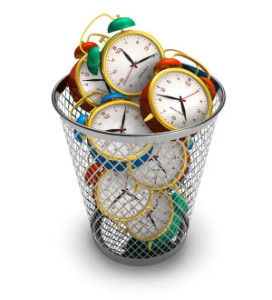 We live in such an excessive society and people waste so much, even food. We also waste our time. The difference is that time is something we don’t have in excess. We each get the same amount of time each day and once it’s spent, it’s gone for good.
We live in such an excessive society and people waste so much, even food. We also waste our time. The difference is that time is something we don’t have in excess. We each get the same amount of time each day and once it’s spent, it’s gone for good.
Do you honestly know where your time is going? How much of your time are you wasting? On average, individuals spend any where from 1.5 to 2 hours of each work day searching for things-files, documents on their computers, contact information, and the list goes on. Not to mention the other ways that time gets wasted. Multiply that wasted time by 5 work days and that’s 7.5 to 10 hours every week when nothing is getting done. With typically 20 work days in each month, that’s 150 to 200 hours of wasted time every month for the average individual, which means that there are a lot of “to-dos” that aren’t getting done because of some big-time time wasters.
So, how do you know you’re wasting significant time? Begin by looking for indicators:
- Messy desk, cluttered work space, things not filed
- Not being able to find things
- Missing, being late for or often rescheduling appointments
- Arriving to meetings unprepared
- Tired and/or unable to concentrate
Once you’ve identified the indicators, work on the solutions:
- Organize your entire work space
- Determine what fits your personality and establish a time management system that fits that personality
- Plan your work and prioritize your list
- Focus on important and not urgent things (this comes into play once you establish good habits)
- Eliminate procrastination
- Delegate the things that you can
- Learn your personal energy cycles and use them
- Control interruptions effectively
When you begin working on the solutions, know that although you may be implementing things immediately, it takes at least 21 days to develop a new habit. Letting go of your big-time time wasters is a process, it can happen quickly, but it doesn’t happen overnight. Allow yourself the time and the room to do so, and when you revert to old habits, simply acknowledge what you’re doing and get back on track. It’s also a good idea to enroll someone in what you’re doing and ask for support as part of your system for getting a handle on increasing your productivity. Remember, how you give your time to is what makes the difference and impacts your bottom line.
